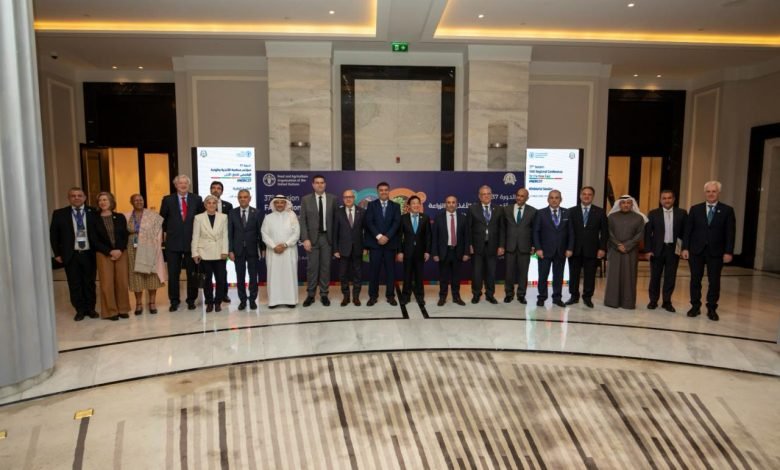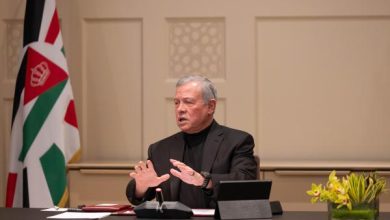
Jordan Daily – The 37th Ministerial Session of FAO Regional Conference for the Near East (#NERC37) has issued a call for a ceasefire in Gaza to facilitate the entry of humanitarian and food aid into the enclave.
The conference’s final statement articulated profound concerns over the worsening humanitarian conditions, the forced displacement of Gaza Strip residents, and the weaponization of food, water, and energy in the war. It strongly condemned the hindrance of humanitarian assistance and the consequent devastation of the agricultural sector, livelihoods, and infrastructure, resulting in critical food insecurity and famine risks.
Held in Amman, the capital of the Hashemite Kingdom of Jordan, on March 4 and 5, the session’s participants underscored their robust endorsement of the FAO Council’s decisions made during its 174th session on Gaza’s food security and related concerns. They expressed solidarity with the people of Gaza, who face an unprecedented situation due to the war in Gaza and conflicts in other countries.
Ministers and heads of delegations from the Near East and North Africa region attending the conference emphasized the paramount importance of fostering peace in a region already beset by deteriorating security conditions and resultant severe crises in food security and nutrition, particularly in Gaza, Sudan, Yemen, the Syrian Arab Republic, and Lebanon.
#NERC37 saw the participation of 335 attendees, including ministers, deputy ministers, and senior officials from ministries of agriculture, water, environment, and health from 23 countries, including 21 regional members. This is in addition to permanent representatives of governments to FAO, FAO staff, representatives of regional organizations, the private sector, civil society, and academia.
The final statement also voiced deep concern over the escalating rates of hunger, acute food insecurity, and malnutrition in the region, as highlighted in the recently published FAO’s Regional Overview of Food Security in the Near East and North Africa report.
These troubling conditions underscore structural vulnerabilities in the region, compounded by significant challenges arising from wars, conflicts, social unrest, high reliance on imported food, financial and economic crises, resulting in food price inflation, among other obstacles. Furthermore, the challenges posed by climate change, water scarcity, soil erosion, and erratic weather patterns exacerbate the decline in agricultural productivity.
The statement underscored the imperative to continue supporting member states in addressing water scarcity, drought, and desertification, and adopting integrated and sustainable approaches to water management and utilization of non-conventional water resources. Additionally, it stressed the need to accelerate the transformation of agricultural food systems in the region to enhance efficiency, inclusivity, sustainability, and resilience, thereby addressing current and future challenges and advancing progress toward achieving the Sustainable Development Goals.
Emphasizing the pivotal roles of smallholders, women, and youth in transforming agri-food systems for enhanced production, nutrition, environmental sustainability, and livelihoods without leaving anyone behind, the statement highlighted the importance of developing analytical systems for monitoring and reporting on food security and formulating appropriate policies accordingly.
At the conclusion of the 37th Ministerial Session of FAO Conference for the Near East, ministers and heads of delegations reiterated their support for the organization’s four regional priorities for the 2022-2031 period, aligning with the strategic areas aimed at assisting regional countries in transforming their agricultural food systems under the umbrella of the organization’s 2022-2031 strategic framework.
These priorities address critical issues, including supporting comprehensive rural transformation empowering youth and women, addressing food insecurity and the triple burden of malnutrition, promoting trade, and tackling root causes of vulnerabilities by focusing on climate change, water scarcity, sustainable natural resource management, resilience-building, and risk management through proactive, comprehensive programmatic approaches.
Conference participants welcomed the organization’s regional initiatives aimed at enhancing policy and leadership capacities to transform agri-food systems. These initiatives include the establishment of a regional leadership academy for agri-food system transformation, a regional observatory for food security and nutrition, the Arab Forum for Rural Advisory Services, and a regional One Health platform. Additionally, there was a focus on leveraging trade, investment, science, innovation, and technology as enablers of food security, alongside engaging stakeholders from agri-food systems, civil society, academia, and the private sector.
They also reiterated their commitment to integrating agroecology, sustainable agricultural practices, and other innovative methods, such as climate-smart agriculture and conservation agriculture, into national policies, strategies, and investment plans to enhance farmers’ adoption and contribute to the United Nations Decade for Ecosystem Restoration while bolstering small-scale agriculture productivity and resilience.
Delegates of #NERC37 expressed their appreciation to Egypt and the United Arab Emirates for hosting 27 and 28 sessions of the Conference of the Parties to the United Nations Framework Convention on Climate Change (COP27 & COP28) and highlighting agriculture and food security as the main issues on the agenda of these two events. They also praised the UAE’s initiative on climate change and food security.
The conference’s final statement reaffirmed the Kingdom of Saudi Arabia’s support for the successful hosting of the 16th session of the Conference of the Parties to the United Nations Convention to Combat Desertification (UNCCD) in December 2024. Moreover, it urged countries and partners, including international financial institutions, the private sector, FAO, and other United Nations bodies, to secure increased investments through innovative financing mechanisms to support efforts in transforming agri-food systems in the region.

